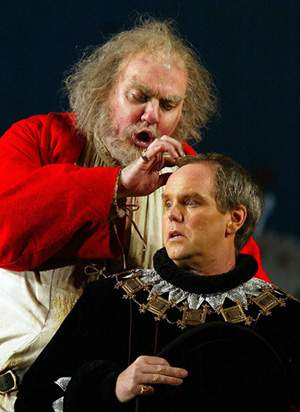S & H Opera Review
Verdi, ‘Falstaff,’ Royal Opera, Covent Garden, 15th February 2003 (ME)
At the end of Henry IV Part II, Shakespeare promises that he will ‘continue the story with Sir John in it’, but as far as the playwright was concerned that was the end of Falstaff on stage, with ‘Henry V’ containing only the report of his death. This revival of Graham Vick’s production seems to have as its aim to show the Falstaff that might have appeared in the latter play: an uncomfortable, chastened, vulnerable figure whose few excursions into comedy are outweighed by the sadness which seems to dominate. It could, of course, simply be that Bryn Terfel’s Falstaff found his mountainous costume difficult to deal with, but one could hardly escape the impression that we were being shown a central figure chiefly remarkable for being an outcast, surrounded by the brash and the colourful.
This production is very close in spirit to the same director’s ‘Meistersinger’ – there we had Nuremberg in miniature, here we have Windsor, we have the same exaggerated codpieces and much of the same in the way of broad comic effects. The colours of ‘Meistersinger’ were a little gentler but the equally genial ‘Falstaff’ is presented with a garish primary palette. It’s unfortunate that the vast resources poured into this house have not enabled a smoother effect on stage, since the scene changes on this evening were far clunkier than anything I’ve witnessed at the supposedly decaying Coliseum – it should not be beyond anyone’s wit to achieve seamless scenery changes, an area in which the ENO’s current Rigoletto is exemplary, despite a vastly more complex set. With the exception of the final scene, under Herne’s Oak, I found the stage pictures contrived and much of the set seemed to give the singers unnecessary problems in managing their costumes.
Bryn Terfel is, of course, the Falstaff of our time and he makes complete sense of this pompous yet ultimately lovable character. ‘L’onore! Ladri!’ and ‘Alice è mia’ were both superbly done, the former ideally persuasive and the latter beautifully tender. This Falstaff is neither an heroic nor a cosy figure and at the end we are left in no doubt that he has been thoroughly fooled – when he launches the final fugue ‘Tutto nel mondo è burla’, he does so grimly rather than with any relish. Indeed, there is very little real humour in this interpretation, perhaps fittingly so, since there is so much of it bubbling about elsewhere.
The merry wives of Windsor were led by the superb Alice of Soile Isokoski, a true Verdi soprano, who sings ‘Come una stella’ so beautifully that one longs to hear her Desdemona – I felt that she is not an instinctive comedienne, but she carried out all her comings-and-goings with aplomb. The other remarkable performance amongst the ladies was the Mistress Quickly of the American mezzo, Stephanie Blythe, making her debut with the Royal Opera. She is a natural comic who throws herself into the part and sings with rich tone and confident projection – her little scene with Falstaff (‘Reverenza’) was a delight. The other two ladies, the Meg of Marie McLaughlin and Nannetta of Rebecca Evans made slightly less impression, perhaps because they were the most obviously conceived as stock characters.
Ms Evans was not helped by one of the weakest Fentons I’ve heard – Massimo Giordano is (gasp!) a real Italian, but you would never think it from the sound he makes since this resembles the politest kind of English tenor one can imagine. It is a fairly ungrateful rôle, but during the Act I duet it was Nannetta who sounded the more Italian. Some of the best singing on stage came from Anthony Michaels-Moore as Ford – this is potentially another ungrateful part, but his jealousy monologue was one of the best performances by a Verdian baritone that I have heard in a long time.
Antonio Pappano gave a very fine account of the score, and I was surprised by the relatively lukewarm reception he received. He supported the singers with intuitive sympathy and gave an exhilarating account of such passages as the Act III ending where the orchestra so beautifully counterpoints Falstaff’s homage to wine.
The final scene is a superb coup de theâtre with the branches of the oak tree depicted by dangling spirits and the whole stage picture dominated by tones of purple, blue and white. As with Vick’s ‘Meistersinger,’ this is not the greatest production of ‘Falstaff’ you’re ever likely to see, but it is entertainingly staged, beautifully sung and, in Terfel, has as fine a Sir John as anyone could desire.
Melanie Eskenazi

Credit: CLIVE BARDA
Falstaff - Verdi, ROH 8.2.03
Sir John Falstaff - Bryn Terfel
Ford - Anthony Michaels-Moore
Credit: CLIVE BARDA
Falstaff - Verdi, ROH 8.2.03
Sir John Falstaff - Bryn Terfel
 Return to:
Return to: